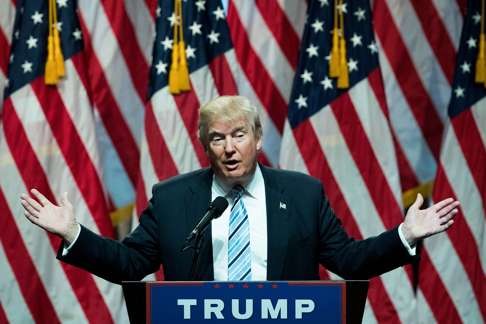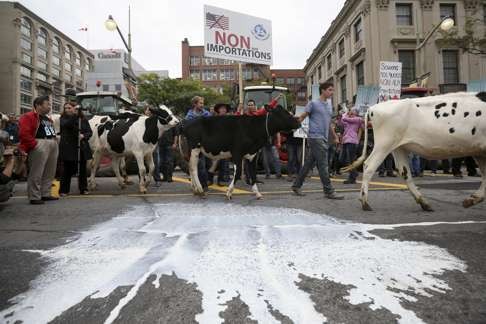
With the Trans-Pacific Partnership all but dead, what next now for world trade?
Jean-Pierre Lehmann says if global trade is not to fall into disarray, the TPP, which has been problematic from the start, must be replaced by a wide-ranging new agreement

I asked the American official if he could tell me whether any of the US presidential candidates had spoken out in favour of TPP. Hillary Clinton, it will be recalled, sensing which way the political winds were blowing, withdrew her support and indicated she would oppose it. This position was reinforced in the negotiations that ultimately culminated in Bernie Sanders’ endorsement. Donald Trump’s position on TPP, as well as on trade in general, is well known. I could not remember whether, out of the plethora of other Republicans who fell by the wayside, any had championed the pact. As I did not get an answer from the official, I presume the answer is no.

Trump rips up Republican trade orthodoxy, saying he will cancel TPP treaty and brand China a currency manipulator
I asked the EU official the same question regarding European national leaders over the transatlantic pact. The only possible candidate might have been David Cameron, but since the Brexit vote has happened, that pretty much put the final nail in the coffin of the transatlantic pact.
The deaths of both agreements are due to a number of causes. There are similarities between the two. However, since the TPP has far greater geopolitical significance, the focus will be on TPP.
Whereas in the old GATT days, trade was not a political issue, it has become quite dramatically so
First, a bit of perspective. Perhaps one of the greatest paradoxes of the 21st century is that while merchandise trade has boomed since the conclusion of the General Agreement on Tariffs and Trade (GATT) Uruguay Round in 1994 and the founding of the World Trade Organisation in 1995, global trade governance is in a state of disarray.
This is due to the numerous new actors on the global trade stage, especially the mammoth new kid on the block, China. GATT was a comfy club of rich nations, directed by the so-called Quad – the US, Canada, the EU and Japan. To them the new players appeared as uppity interlopers. The attitude was that if they want to play on “our” stage, they will have to abide by “our” rules. This is leaving aside the fact that the countries of the Quad did not first establish rules and then become powerful and prosperous, but the reverse: first, plunder, then establish the rules to prevent new actors from doing the same.
While in the old GATT days, trade was not a political issue, it has become quite dramatically so. In many countries, trade is deeply unpopular: in developing countries because of the fear of exploitation by the rich countries, in rich countries because of the fear of job losses due to cheap wages and “unfair” trade practices.

TPP meets stiff opposition from Malaysian Muslims, who fear it would lift restrictions on alcohol, porn and prostitution
The seeds of the anarchic state of global trade governance were sown at the chaotic WTO ministerial meeting held in Seattle in 1999. Following the failure of Seattle, a new WTO ministerial meeting was scheduled in Doha, Qatar in November 2001. Prognostics were that Doha too would fail. Then suddenly there emerged a “black swan” – an unexpected, unscripted event that has a huge impact – in the form of September 11, just a few weeks before the opening of the Doha summit. In order for the world to demonstrate solidarity, it could not be allowed to fail. So in November 2001, the WTO Doha Development Agenda was launched.
What has happened as the WTO agenda has dissolved is the growing fragmentation of the global trade regime
Its reprieve was short-lived. At the Cancun ministerial meetings in 2003, I became quickly convinced that it would not work. There was no dialogue, no reflection, no reaching out, as all the major players engaged in mercantilist rhetoric reflecting established positions. The fumbling attempts at erecting a facade of global trade governance by “rescuing” the Doha agenda convinced me by 2005 that it was dead. I wish I had been wrong.
Whereas I was in favour of the Doha agenda and remain convinced that ultimately the world needs a rules-based, but especially equitable and inclusive multilateral trade regime, I am against TPP (and the transatlantic pact). What has happened as the WTO agenda has dissolved is the growing fragmentation and geopoliticisation of the global trade regime, mainly evidenced by a proliferation of preferential trade agreements, most starkly in the proposed mega-regionals.
I oppose TPP not for the same reasons as Sanders (or, now, Clinton), let alone Donald Trump – but because it is a huge error in seeking to boost peace and prosperity in the 21st century. To propose a Trans-Pacific Partnership by a priori excluding China, the world’s biggest trading power, the new kid on the block, though one with scars from a previous existence – the Opium War and all that – is wrong. President Barack Obama’s remark that “we can’t let countries like China write the rules of the global economy, we should write those rules”, and the amazingly incendiary remark of his defence secretary Ash Carter – “TPP is as important to me as another aircraft carrier” – add profound insult to deep injury.

Why Hillary Clinton’s wavering on TPP could be nail in the coffin of Barack Obama’s ‘Asian pivot’
That is of course not the reason the TPP will die. Its demise is due to domestic political forces reflecting the strong anti-globalisation backlash the world is currently experiencing. Thus with the pact failing for the wrong reasons, we end up with the worst of both worlds. Following the death of Doha and the deaths of both the trans-Pacific and transatlantic agreements, the world trade regime is in even more anarchic disarray. Bellicose anti-China rhetoric has further hampered the possibility of a climate of global cooperation rather than confrontation. TPP has made the situation worse, but its death will not solve anything.
The Pacific charter must be deliberated over, signed and issued before war breaks out
As the causes of the global trade disease are deep, there is an urgent imperative for solid and long-lasting remedies.
The Atlantic Charter signed by US president Franklin D. Roosevelt and British prime minister Winston Churchill in 1941 set out eight key principles aimed at ending decades of war, including economic war, across the Atlantic and thereby set the stage for the future. It worked brilliantly; there has been no Atlantic war since, but instead unprecedented peace and prosperity.
In recent decades, however, the world has moved from the Atlantic era to a Pacific era. As things currently stand on many fronts – for example, in the South China Sea – prospects are potentially alarming. The Atlantic Charter was signed and issued after war had already broken out. The Pacific charter must be deliberated over, signed and issued before war breaks out.
Given its economics, its history, its geographic location, its geostrategic importance and its intellectual and physical infrastructure, Hong Kong stands out as the obvious place for the Pacific charter to be discussed and issued.
But before that, let us note the passing of the TPP. May it RIP.
Jean-Pierre Lehmann is emeritus professor of international political economy at IMD, founder of the Evian Group, and visiting professor at the University of Hong Kong

